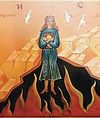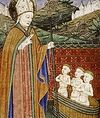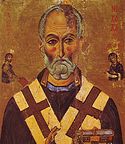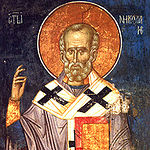

| Previous day | Next day |
| Old Style
May 9
|
Sunday |
New Style
May 22
|
| 5th Sunday of Pascha. Sunday of the Samaritan Woman. Tone 4. | No fast.
|
![]() Prophet Isaiah (8th c. b.c.).
Prophet Isaiah (8th c. b.c.). ![]() Martyr Christopher of Lycia, and with him Martyrs Callinica, Aquilina, and 200 soldiers (ca. 250).
Martyr Christopher of Lycia, and with him Martyrs Callinica, Aquilina, and 200 soldiers (ca. 250). ![]() St. Shio of Mgvime, monk, of Georgia (6th c.).
St. Shio of Mgvime, monk, of Georgia (6th c.). ![]() Translation of the relics of St. Nicholas the Wonderworker from Myra to Bari (1087). St. Joseph, elder, of Optina Monastery (1911).
Translation of the relics of St. Nicholas the Wonderworker from Myra to Bari (1087). St. Joseph, elder, of Optina Monastery (1911).
Translation of the relics of Child-martyr Gabriel of Slutsk (1775).
New Hieromartyr Dimitry Voskresensky, archpriest, of Anastasovo (Chuvashia) (1938).
Martyr Epimachus of Pelusium, at Alexandria (250). St. Maximus III, bishop of Jerusalem (ca. 350). Martyr Gordion, at Rome (362). Monk-martyr Nicholas of Vouneni in Thessaly (901).
Thoughts for Each Day of the Year
According to the Daily Church Readings from the Word of God
By St. Theophan the Recluse

Sunday of the Samaritan Woman. [Acts 11:19–26, 29–30; John 4:5–42]
The Samaritan’s woman fellow citizens said to her after two days with the Saviour in their midst, Now we believe not because of thy saying: for we have heard him ourselves, and know that this is indeed the Christ, the Saviour of the world (John 4:42). It happens this way with everyone. At first they are called to the Lord by an external word, or as for many now, simply by birth. But when they taste in practice what it is to live in the Lord, they no longer cleave to the Lord through their external affiliation with Christian society, but through their inner union with Him. It is necessary for all who are born in Christian societies to make this a law for themselves; that is, to not limit themselves to mere external affiliation with the Lord, but to seek to unite with Him inwardly, that they may always bear witness within themselves that they are standing in the truth. Why is this necessary? It is necessary to embody within oneself the truth of Christ. The truth of Christ is a restoration of what is fallen. Thus, put off the old man, which is corrupt according to deceitful lusts, and put on the new man, which is created after God in righteousness and true holiness (cf. Eph. 4:22–24), and you will know within yourself that the Lord Jesus Christ is in truth the Saviour—not only for the world, but also for you.
Articles
 Prophet IsaiahThe Holy Prophet Isaiah lived 700 years before the birth of Christ, and was of royal lineage. |
 Martyr Christopher of LyciaThe Holy Martyr Christopher lived during the third century and suffered about the year 250, during the reign of the emperor Decius (249-251). |
 1500 years of Georgian Monasticism—St. Shio-Mgvime MonasteryAndrei GermanSt. Shio is among the Great 13 Assyrian Fathers, who came at the end of the fifth century from Antioch to preach Christ. |
 A Strange Miracle of St. Nicholas in 1956A true incident which shocked and brought repentance to hundreds of people in the Russian Soviet city of Kuibyshev (modern day Samara), in the year 1956. |
 Venerable Joseph of OptinaSaint Joseph of Optina was born on November 2, 1837 in the village of Gorodishcha in the province of Kharkov. |














